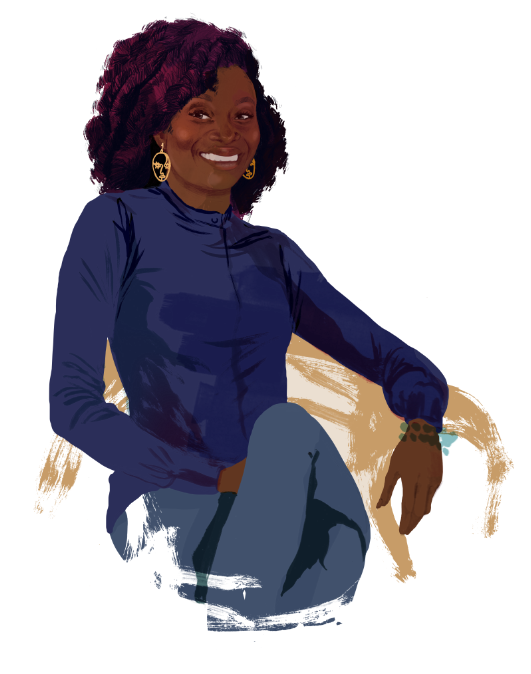Some of our followers on social media saw oh columnist Tamu Thomas’ story in our highlights, about her column which explores the effects of systemic racism. They asked if we could publish the column to our blog so that more people might get to read it, beyond the printed magazine. It’s taken from our current issue, oh mag 54 Midsummer, which is available to buy now.

Tamu Thomas, illustrated by Hazel Mason
“Comparison is the thief of joy” resonates with many. There is some comfort in remembering that a significant part of this thief is external and can be softened with a hearty dose of compassionate introspection. I used to compare myself to others all the time. Growing up as a child of West African immigrants, in the ‘power’ era of the eighties, meant that comparison was normal.
As a kid, comparison was used as a (highly problematic) source of inspiration – a barometer of sorts. From the teachers who regularly compared us to our classmates, and my parents ,who like many other immigrants, compared me to the children of both relatives and passing acquaintances. The aim was to galvanise my ambition, but all it ever did was highlight my own perceived inadequacy.
In addition to this comparison, there was (and is) a racialised element here that resonates hard with black and brown people, regardless of background. Racialised comparison comes from having to live in a world where the prevalent hierarchy holds white up as being supreme. Consequently, immigrant parents passed on the well-meaning yet cumbersome protective rhetoric that as a people of colour, it would be necessary for us to work twice as hard in exchange for half as much as our friends of a white European background. In addition to our lived experience, there is an abundance of evidence to support this – google ‘ethnicity pay gap’ and you will find the tip of the insidious iceberg.
This racial comparison then, which has come to shadow almost every part of my life, is one of the most deeply-rooted parts of my unconscious programming: lodged in my brain’s neural pathways, continually drip-feeding a comparative narrative to my autonomic nervous system, impacting me on every level. But it needn’t.
The work of people such as comparison coach Lucy Sheridan helped me to understand the nature of comparison and how it manifested in my life. I thought I’d put it all behind me, until I observed myself self-sabotaging the opportunities I had longed for. For a long time, I’d believed that self-sabotage was underpinned by a deeper fear of being powerful beyond measure (thank you Marianne Williamson). But I’ve had to question that.
My life experiences have conditioned me into thinking that I don’t get what I deserve, even when I work twice as hard. I felt this as a kid on so many occasions, but none more so than when my standing ovation-worthy audition for the role of Sweeny Todd was still not good enough to get the part. And yes, it still stings. While today I’m still subject to those hard, conditioned lessons and still fall prey to self-sabotage, the good news is that it no longer limits or defines me. I feel the beginnings of it in my body, and using Somatic movement therapy, I immediately work to release it – clearing away the fear and doubt that resides in my cells, bit by bit. Today, at least, I really do know that I am indeed capable of having and keeping the things I want. And so I get up, get on and go get 'em.
Move your body to loosen your conditioning
To create flow – Self-sabotage indicates stagnation and moving your body is a great way to get rid of it. Rather than sit and brood, go for a brisk walk and use the voice note app on your smartphone to capture your thoughts & creative inspiration.
For body connection – include body scans in your day so that you can become familiar with your inner body language and be compassionately curious rather than treat sensations like inconveniences that require an external cure. Tara Brach has useful body scan meditations on her website.
To learn more about body-oriented and Somatic movement read Bodyfulness: Somatic Practices for Presence, Empowerment, and Waking Up in This Life by Christine Caldwell
Tamu Thomas is the founder of Three Sixty, which aims to help busy women find value and joy in their lives through group coaching. livethreesixty.com